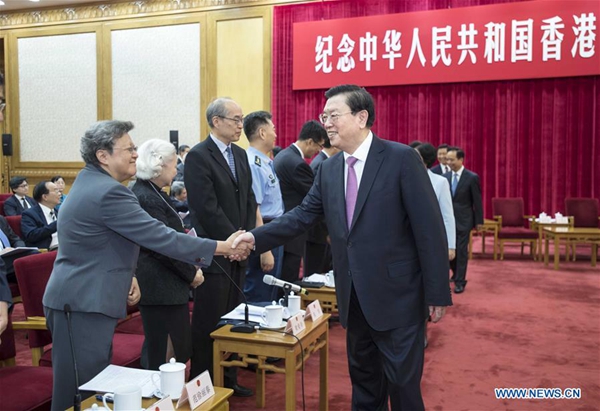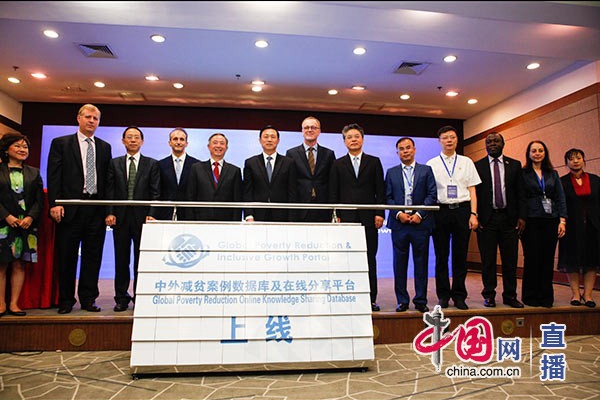China commemorates 20th anniv. of HKSAR Basic Law
|
|
|
Zhang Dejiang (R, front), chairman of the Standing Committee of the National People’s Congress (NPC), attends a high-ranking symposium commemorating the 20th anniversary of implementing the Basic Law of the Hong Kong Special Administrative Region (HKSAR), at the Great Hall of the People in Beijing, capital of China, May 27, 2017. [Xinhua/Li Tao] |
China held a high-ranking symposium on Saturday to commemorate the 20th anniversary of implementing the Basic Law of the Hong Kong Special Administrative Region (HKSAR).
Addressing the symposium, which was held at the Great Hall of the People in Beijing, top legislator Zhang Dejiang called for comprehensive and precise implementation of the principle of “one country, two systems” and the Basic Law.
Zhang, chairman of the Standing Committee of the National People’s Congress (NPC), called the HKSAR Basic Law “a product of ingenuity of a great era,” which fully embodies the shared desire of all Chinese including Hong Kong compatriots and has demonstrated great vitality.
SUCCESSFUL IMPLEMENTATION
Enacted in accordance with China’s Constitution, the Basic Law specifies the guidelines of “one country, two systems”, and “Hong Kong people administering Hong Kong” with a high degree of autonomy.
The Basic Law is a good law which accords the actual conditions of the nation and the HKSAR and is able to provide a fundamental guarantee for the great cause of “one country, two systems” and withstand the test of practice, Zhang said.
The practice of the Basic Law over the past 20 years shows that the fundamental purposes of safeguarding national sovereignty, security and development interests as well as maintaining Hong Kong’s long-term prosperity and stability must be adhered to in order to advance the cause of “one country, two systems,” Zhang noted.
BEST ARRANGEMENTS
HKSAR Chief Executive Leung Chun-ying said at the symposium that the principle of “one country, two systems” and the Basic Law are the best constitutional arrangements for both the HKSAR and the country.
With the combined advantages of “one country, two systems”, Hong Kong can participate in the country’s major development strategies including the national 13th Five-Year Plan and the Belt and Road Initiative, while serving as a “super-connector” between the mainland and the rest of the world at the same time, Leung said.
The coordinated and joint development of the HKSAR and the mainland would not only improve their overall competitiveness, but provide the world new experiences of cooperation between regions of different systems, thus enriching “one country, two systems,” he said.
Elsie Leung, deputy director of the Commission for the HKSAR Basic Law of the NPC Standing Committee, said the implementation of the Basic Law has helped realize the “one country, two systems” concept, stabilize the relationship between the central government and Hong Kong, and clarify the legal status of the HKSAR.
As the Basic Law was well received by Hong Kong citizens, a seamless and stable transition has been achieved with Hong Kong’s capitalist system and life styles unchanged, its legal system improved, judicial independence ensured, democracy developing step by step, and external affairs in sound shape, she said.
TO CORRECT MISINTERPRETATIONS
Noting that some people have developed misunderstanding of the policy of “one country, two systems” and the Basic Law, Zhang called for efforts in raising public awareness and correcting deliberate misinterpretation of the Basic Law.
“We should resolutely oppose statements and deeds that distort, challenge or even violate the Basic Law to uphold its unshakable authority,” said Zhang.
Zhang also stressed that power exercised by the HKSAR is delegated by but not separated from the central government and under no circumstances should anyone be allowed to challenge the power of the central government in the name of a high degree of autonomy.
The political system of the HKSAR is neither one of separation of powers nor a legislative-led or judiciary-led system, but an executive-led system with the chief executive at its core, Zhang explained.
Hong Kong’s long-term prosperity and stability can only be based on accurate understanding and strict and full implementation of the Basic Law, according to Song Zhe, deputy head of the Hong Kong and Macao Affairs Office of the State Council.
DEFENDING THE CONSTITUTION
National identity based on the Constitution is the core value for making and enforcing the Basic Law, said Han Dayuan, a law professor of Renmin University of China, urging efforts to promote the Constitution and make it a powerful guarantee for the prosperity, stability and sustainable development of Hong Kong.
Zhang also called for special attention on strengthening education of the young people in Hong Kong about the country’s national conditions and the rule of law to instill in them a strong sense of national identity, of being Chinese and the rule of law.

